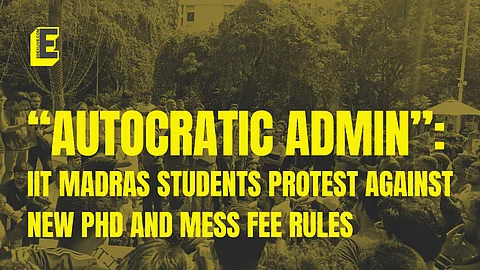

The research scholars of the Indian Institute of Technology (IIT) Madras began a sudden protest against the institute's administration on the campus today, January 17.
This protest, they say, is against two new directives issued by the administration in particular, and the administration’s “autocratic mindset” in general. The directives in question are the new academic regulations for Masters’ of Science (MS) and PhD students, and the mess regulations issued by the Office of Hostel Management.
PhD Regulations – too much pressure, too little agency?
As per the PhD regulations, which were deliberated upon and finalised in the 305th meeting of the Senate, MS and PhD students are required to register for research credits for the duration of their time in their respective programmes, worth 60 academic credits.
The regulations also mandate a 60-hour work week for the scholars.
In addition, the regulations also assign the parameters for grading the scholars’ performance under the credits programme, which are:
S: Student has an accepted journal/conference paper as a primary author
A: Student has submitted a journal/conference paper as a primary author
B: Student has worked diligently in the period but either (a) or (b) above do not apply
C: Student has put in work, but not to the best of his/her ability
D: Student has performed way below expectations, but there were exceptional circumstances (medical problems and/or issues related to mental wellness, provided these have been flagged)
E: Student has performed way below expectations
U: Student has not been working and/or coming to the department regularly
The scholars are to be assigned these grades by their research guides based on their performance. Further, from this grading system, it is apparent that the scholars are expected to have a sizeable research output of one paper per semester.
According to the protesting students, this places too much power in the hands of the research guides.
“The way research scholars are ill-treated at IIT Madras by their guides is no secret, especially in the Sciences. We all know how Sachin (Jain) was harassed by his PhD guide, and how this pushed him to suicide,” one of the protesting students says, on the condition of anonymity.
He adds that these regulations only increase the scope of harassment experienced by research scholars at the hands of their guides.
With the newly mandated working hours, extra powers to the research guides, and the pressure to publish more publications, the academic environment would not be conducive for the scholars to conduct quality research, the scholar says.
Inconsiderate hostel fee regulations
However, he adds that the hostel regulations are what make matters worse for the scholars.
He alleges that the Office of Hostel Management has been pressuring the students to pay the hostel and mess fees seven months in advance.
“We are being asked to pay the fees from January to July – which amounts to up to Rs 60,000 – upfront, despite just clearing the fees for last month,” the scholar says.
Further, students who are unable to pay the fees are finding out that their mess registration has been blocked – and they are prevented from entering the mess as a result, the scholar says. He also accuses the administration of threatening to lock the hostel rooms of these defaulters.
“Hundreds of students at IIT Madras have received this mail, and had their mess registration revoked overnight,” he said, adding that this also happened to him at 1 am today.
“Most of us protesting here did not even have our breakfast today,” the scholar said. He also adds that the administration has also been threatening to call the parents of those who are unable to pay the fees.
This new rule, as well as the administration’s way of enforcing it, is causing a lot of worry among PhD scholars.
According to the scholar, a majority of the research scholars at IIT Madras are first-generation learners from underprivileged backgrounds and even have families dependent on them.
“Most of us send money back home. If the hostel administration makes us pay the entire semester’s fees upfront, what should we do – run our families, or pay the fees?” the scholar asks.
Even though the scholars receive their fellowship stipends from the Council of Scientific and Industrial Research (CSIR) and the University Grants Commission (UGC) regularly under the Junior Research Fellowship (JRF), they have not received their arrears from either CSIR or UGC over a year.
Administration blocking all forms of dialogue
The protesting students also say that the administration has not consulted with the students before officiating both directives.
“We have to bear the consequences of the administration’s decisions – yet, we are the ones absent from the decision-making process,” the scholar says. “Even though we have an elected student body, they either toe the administration’s line, or the administration passes these directives bypassing them,” he claims.
Moreover, when the students tried to express their concerns regarding these directives by responding to the emails from the administration, their emails were filtered out by the institution’s central mail system.
“These regulations are formed in a very arbitrary manner, and imposed on us in a very disrespectful way. If we don’t comply, we are punished like children. There is no proper channel for airing our issues with the administration’s policies. If you make us work for 60 hours a week, and deny us food and shelter when we are unable to follow the unfair fee rules, how can we produce quality research and intellectual property?” the research scholar asks.
“This is extremely unbecoming of IIT Madras, which is ranked number one in India by the NIRF (National Institutional Ranking Framework),” the scholar adds.
This protest will go on until the administration agrees to listen to their concerns, says the scholars.
In the meanwhile, ChintaBAR, an independent student collective from IIT Madras, also wrote to Prof V Kamakoti, Director of the institution, urging him to allow the students to pay the hostel fees in instalments.
